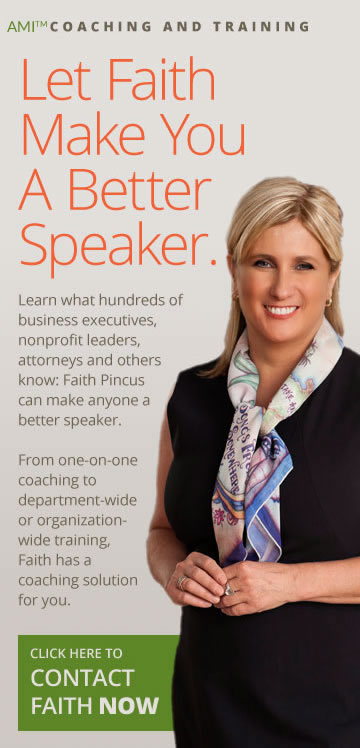How Can A Lawyer Become a Public Speaker?
Earlier this week someone on Twitter asked me a question that I have often liked answering: How can an attorney get started in public speaking?
Below I put together a how-to guide, which I hope can be of use to any new legal speakers out there. For new speakers, I would also check out my Top 10 CLE Speaking Tips.
1. Decide on a specific topic you really like to talk about, and know really well.
This absolutely essential for any public speaker, which is why it’s both worthy of repeating and put at the top of the list. The subject-matter of your speeches will set you apart from so many established public speakers, but you must commit to studying this topic on an ongoing basis.
People attend speeches not just to be entertained, but to be informed on the latest trends and techniques in their industry. If you were to focus on social media in your speeches, for instance, you would be on a never-ending quest for information.
2. Decide which type of speaker you want to be: paid or unpaid.
Speaking engagements can serve different purposes. Some public speakers draw the majority of their income from paid gigs, and have done very well doing so. Many other professionals speak publicly to get referrals and clients, promote a product, raise awareness of a brand or cause.
Plenty of lawyers have transitioned from a career in practice to a career in public speaking, while other lawyers have used public speaking as means for building their firm’s profile.
3. Be prepared to speak for free. For a good long while.
It doesn’t matter if you are planning on being a paid or unpaid speaker. Beyond even honing your craft, building your speaking career can take very long before significant progress is made. By taking free speaking gigs, you can get positive testimonials from an increasing list of satisfied customers.
Speech and meeting planners with paid jobs require speakers with a proven track record of success, and a speech topic that audiences will care about. For some speakers, this process of “courting” with free speaking can take months or years but will hopefully generate long-term business.
4. Target your audience. Lawyers: look at bar associations.
Think again through all of the above-mentioned steps, and find the groups that would be interested in your topic. For lawyers, the first place to look should be state and local bar associations, as well as ABA events. Bar associations hold events each year, regardless of recessions, and are always looking for new speakers for MCLE programs.
Beyond that, look at MCLE providers, and study the differences between those companies.
Pincus Professional Education has one owner who personally decides upon speakers and is heavily involved in the CLE planning process, Faith Pincus. Other CLE providers offer greater or fewer number of events each month, but are managed entirely differently.
Some CLE providers are picky about hiring or even scheduling new speakers; some are not. Many private CLE provider Web sites maintain “Become a Speaker” links, normally accompanied by a form you can submit.
Lawyer and non-lawyers can look outside the law for their opportunities: rotary clubs, counting associations, unions functions, conventions, colleges, corporate meetings, and elsewhere.
5. Join the National Speakers Association to improve your marketability. Join Toastmasters to become a better live speaker.
I would recommend most new speakers, including lawyers, to become members of both of these organizations at the start of their careers. If you are a new speaker, it at least puts you in a room with experienced speakers who have fashioned a variety of career paths. Toastmasters will help you hone your skill at less expense than hiring a speaking coach like Faith. NSA will teach you how to market yourself and create products.
Relationships you develop in the NSA or possibly even Toastmasters can lead to future business.
6. Since times are tough for public speakers, you must be diligent.
The recession has hit public speakers extremely hard, because speaking engagements are a luxury to be sacrificed when a company or organization is on hard financial times. And yet, you can find thousands of speakers who have weathered the storm, and some have even increased revenue since 2007.
Starting a public speaking career can be extremely arduous, but you won’t have to look hard to find experienced speakers who love what they do and don’t want to stop doing it. Even a 20-year attorney can stumble towards becoming a speaker, so feel free to contact me if you have any additional questions. And remember – to have a successful speaking career – you really have to be a good speaker, so hone your speaking skills at every chance you get.

